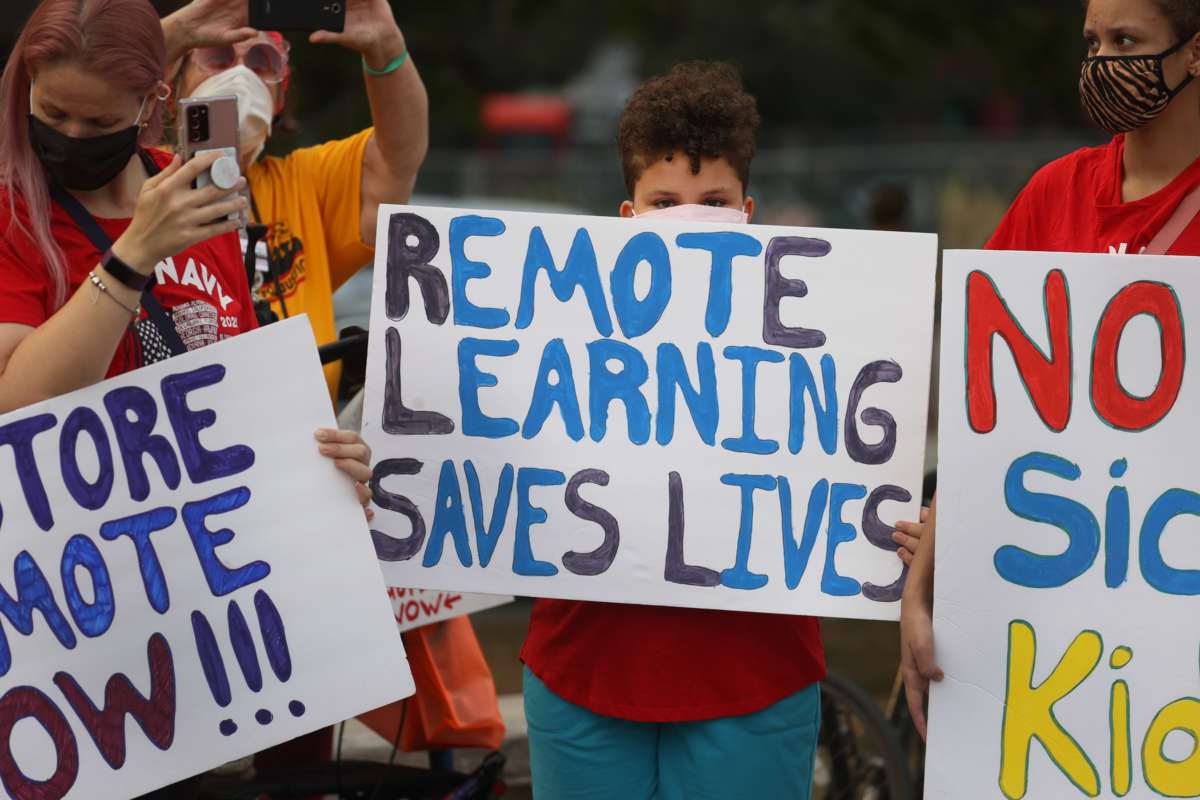Support justice-driven, accurate and transparent news — make a quick donation to Truthout today!
The Chicago Teachers Union (CTU) voted on Tuesday to return to remote teaching until coronavirus cases in the city go down. In response, school district officials — who oppose a return to virtual learning — cancelled all classes for Wednesday, a move that affected more than 340,000 students in the third-largest school district in the country.
Chicago Public Schools (CPS) also locked teachers out of their Google Classroom accounts, blocking them from interacting with students and preventing them from giving students updates about lesson plans for the next day. District officials said they would update the plan for resuming classes by the end of Wednesday.
In its vote on Tuesday, 73 percent of CTU teachers said they supported a return to virtual learning — a move the union said was difficult but necessary.
“As educators, parents, neighbors and community members, we had to make the tough decision to support a resolution to return to remote learning in our city’s public schools,” a statement from CTU read. “This decision was made with a heavy heart and a singular focus on student and community safety.”
CTU leaders noted that the school district has still not addressed concerns about the spread of COVID-19 that teachers have been bringing up to the school board for months, even in light of the more rapidly spreading Omicron variant.
“The layers of mitigation that we need to keep our schools open and keep our students inside of the school buildings have not happened here in Chicago,” CTU vice president Stacy Davis Gates said to CNN.
The union has long argued for more testing of students and teachers, a measure that the district has still failed to enact.
“If we had testing, if we had a way to help ensure that people coming into the buildings weren’t carrying the Omicron variant, that would be a different matter, but that’s not what’s going on right now,” CTU president Jesse Sharkey said.
The school district has disregarded other agreements it made with the union, including thresholds for requiring a return to virtual learning if the pandemic worsened. In February, both CTU and CPS agreed to “pause in-person learning for 14 days and transition fully to remote instruction” if certain criteria were reached, including seven consecutive days of rate increases — rates being at least 15 percent higher on each of those days than they were the week prior. On the seventh day, the positivity rate within the city of Chicago should be 10 percent or higher than it was the week before in order to pause in-person instruction, they decided.
All of those metrics have been reached. Indeed, positivity rates in Cook County, Illinois, have far exceeded that threshold, as the area has seen a 121 percent increase in COVID-19 cases over the past week, and a 60 percent increase in hospitalizations overall.
Children in the city have been negatively impacted by the rise in coronavirus cases. “We are seeing twice as many kids in the hospital who are testing positive for COVID than we saw even back in our bad peak in September,” Allison Bartlett, associate professor of pediatric infectious diseases at the University of Chicago, said to NBC 5 Chicago last week.
CTU members defended their votes on social media, saying that changes needed to be made to protect both teachers and students before they would agree to return to in-person instruction.
“I voted yes because I only have 3 fully vaccinated students and nothing would break my heart more than one of them getting sick and hospitalized with COVID,” said CTU member and organizer Abby Agriesti. “This is for everyone’s safety.”
CTU member Katie Sedai suggested that city leaders, including Chicago Mayor Lori Lightfoot, didn’t have a clear picture of what was going on within the district.
“I do get the feeling that [because] our Mayor has such a toxic leadership style she probably has not been told the actual [conditions] in schools right now,” Sedai said on Twitter. “I could see the [people] still around her being too frightened to tell her the full story & even if they did, her being too proud to hear.”
Many educators in Chicago schools are frustrated with Lightfoot’s refusal to take their fears seriously. In early December, as educators in the city were expressing deep concern about the spread of the virus, a longtime teacher’s aide, 44-year-old jonL Bush, died due to COVID-19. When CTU brought up Bush’s passing as an example for why better mitigation measures were needed in schools, Lightfoot accused the union of trying to “score political points.”
Most teachers will continue to work on Wednesday even though the school day was canceled, Sedai added.
“I will be working today regardless. … I will lesson plan. I will prep materials,” Sedai said. “I am available & ready to work. Why aren’t you, @ChiPubSchools?”
Press freedom is under attack
As Trump cracks down on political speech, independent media is increasingly necessary.
Truthout produces reporting you won’t see in the mainstream: journalism from the frontlines of global conflict, interviews with grassroots movement leaders, high-quality legal analysis and more.
Our work is possible thanks to reader support. Help Truthout catalyze change and social justice — make a tax-deductible monthly or one-time donation today.
